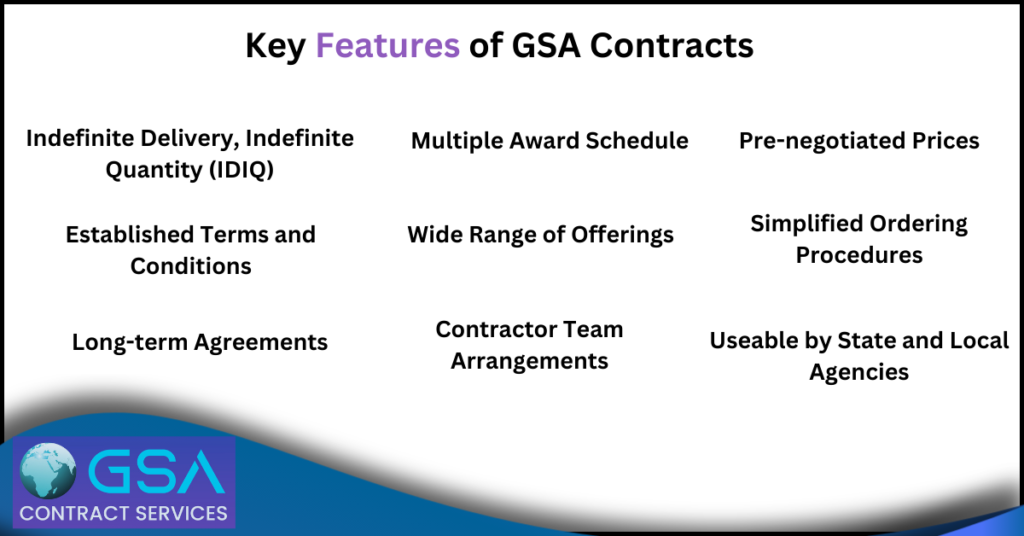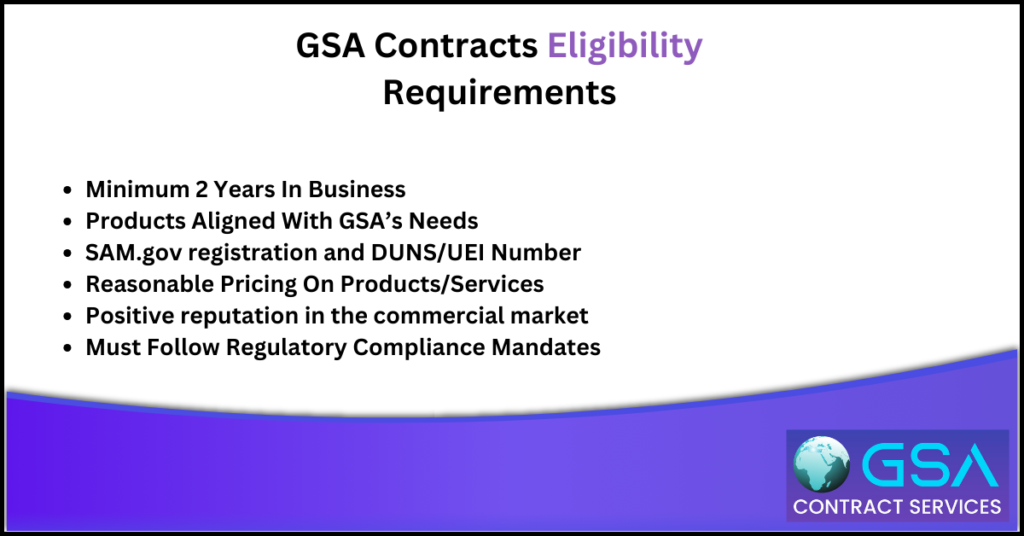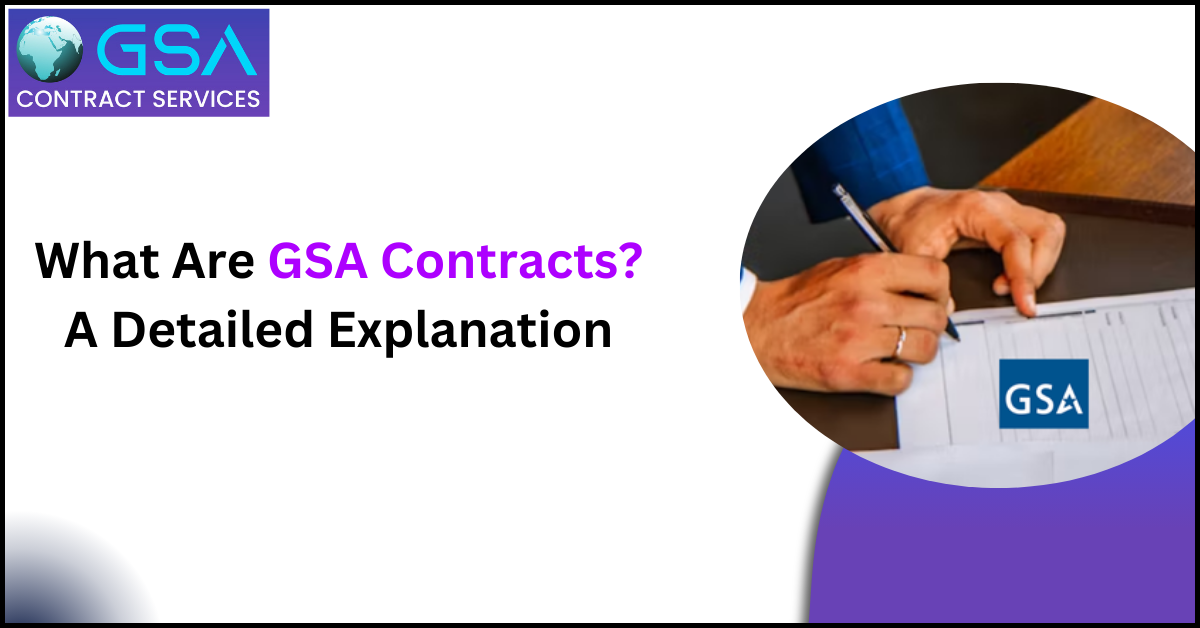A GSA contract is a long-term agreement between the General Services Administration (GSA) and a vendor. The vendor can be a non-profit, a business, a small business, or any agency. GSA Contract allows government agencies to purchase products and services without lengthy procurement processes.
Vendors with a GSA Schedule have pre-approved pricing, terms, and conditions, making government purchasing faster and easier. This article aims to explain the features of a GSA Contract, how it differs from other types of government contracts, who can get one, its benefits, and more.
GSA Contracts: What Do They Mean?
When the federal government wants to buy a product or service, it needs businesses to provide it for them. But how does the process work? Through federal contracts like a GSA Contract.
A GSA Contract is a contract agreement between a business and the government that allows the business to sell its offerings to federal agencies. It means that a business that sells certain products to regular customers or other businesses acquires a GSA Contract to sell to the government.
While GSA Contracts are not the only contract allowing a vendor to sell to the US government, it is by far the most lucrative and effective contract for many businesses, from small to large. The contract covers a wide range of product domains like office management, IT security, military, cleaning, furniture, and more.
With the General Services Administration (GSA) awarding over $45 billion to businesses in the year 2023 alone through the GSA Contracts, it is a must-have for many businesses to secure a good revenue stream for the long term.
Some Terms Associated With GSA Contracts
Some words like GSA Contract, GSA Schedule, MAS Schedule, and FSS Schedule are commonly used in websites, forums, and discussions concerning government contracting and may be confusing. Here is a simple explanation of them.
GSA Contracts: A broad term encompassing all the contracts given by the GSA. They can include Schedule Contracts, BPA agreements, or other types of federal contracts.
GSA Schedules, FSS Schedules, and MAS Schedules are essentially the same thing.
GSA Schedules mean the schedule contracts given by the GSA for one of the 12 categories. FSS Schedule is the old term commonly used for GSA Schedules, and MAS Schedules means a consolidated schedule that is the new and most up-to-date term, where all the different Schedule categories are consolidated into a single GSA Schedule contract.
Key Features of GSA Contracts

Here are some key features of GSA Contracts that make it an extremely lucrative option for many government vendors.
- Indefinite Delivery, Indefinite Quantity (IDIQ): This means the contract establishes a framework for future orders but doesn’t specify a fixed quantity of goods or services. For example, a GSA Schedule for office supplies might not say “10,000 pens” but instead allows agencies to order the pens as they run out, in whatever quantity they need at the time.
- Multiple Award Schedule: This means more than one vendor can hold a contract for the same or similar products/services. Imagine a GSA Schedule for IT services. Multiple companies specializing in network support could all have contracts under that schedule, giving agencies a choice.
- Pre-negotiated Prices: This means the prices for goods and services are agreed upon between the vendor and GSA before agencies place orders. For example, a vendor selling laptops might have a pre-negotiated price of $800 per laptop on their GSA Schedule. So, when an agency needs to buy a laptop, they already know the price they’ll pay and avoid further haggling.
- Established Terms and Conditions: This means the contract spells out all the rules of the game, including things like delivery timelines, warranty coverage, how returns work, and payment schedules, providing clarity and consistency for both vendors and agencies. For instance, the contract might state that all deliveries must be made within 10 business days or made through a specific route.
- Wide Range of Offerings: This means GSA Schedules cover a huge variety of products and services. You can find almost anything, from pens and paper clips to complex software systems and military and tactical gear.
- Simplified Ordering Procedures: This means agencies can easily buy from GSA Schedule vendors using various streamlined methods. This might include online ordering through GSA Advantage!, sending a purchase order, or even using a government purchase card for smaller buys.
- Compliance with Federal Regulations: This means GSA Schedules and the purchases made through them adhere to all relevant federal laws and regulations. For example, the contracts must comply with rules regarding fair competition, FAR regulations, TAA compliance, and small business set-asides.
- Long-term Agreements: This means GSA Schedule contracts typically last for five years, with the option to extend 3 times for a total potential of 20 years. This provides stability for vendors and reduces the administrative burden for agencies, as they don’t have to re-compete contracts constantly.
- Contractor Team Arrangements: This means vendors can team up with other companies to offer a more complete solution. For example, a small IT company specializing in software development might partner with a larger company as a subcontractor that provides hardware and support services to offer a comprehensive IT solution to a government agency.
- Can be used by state and local agencies: The GSA Contracts, while primarily for all 438 US government agencies, can also be used by state and local agencies to acquire products through the Cooperative Purchasing Program. They are used in special cases like disaster relief. For example, during a hurricane in a certain area, a local government can use the CPP to order medicinal or safety products from vendors associated with the GSA Schedule.
GSA Contracts vs. Other Federal Contracts
The US government also uses other types of contracts apart from the GSA Contracts. Let us take a quick look at what these contracts are and how they compare to the GSA Contracts.
Let us take a quick look at what these contracts are and how they compare to the GSA Contracts.
Government-Wide Acquisition Contracts (GWACs)
The GWACs are similar to the GSA Contracts in the sense that they are also multi-agency IDIQ contracts. Some examples include NASA’s SEWP, NIH’s CIO-SP3, GSA’s Alliant 2, etc.
However, they are primarily focused on IT services, as opposed to GSA’s all-encompassing schedules.
Multiple-Agency Contracts (MACs)
Multiple Agency Contracts are used to procure specialized services like IT. They are managed by a single federal agency (like NASA), and other agencies can use the contract to buy products and services.
In a sense, they can be similar to GSA contracts as both are managed by a single agency. However, GSA Contracts are explicitly managed by the GSA, while any federal agency can manage Multi-agency contracts.
Moreover, multi-agency contracts are task-based or order-based, while GSA contracts allow agencies to buy directly from vendors, that too without competition, as they are already pre-approved.
Agency-Specific IDIQs
IDIQ contracts are not specific to GSA. Other federal agencies have their own IDIQ contracts that cater to their specific and recurring needs. These contracts are tailored specifically to the needs of a single agency and are not generally used by other agencies.
For example, the Department of Defense’s SeaPort-NxG for Navy support services.
They differ from GSA contracts as GSA contracts are for all agencies, used for more general-purpose procurement, and do not cater to the needs of any specific agency.
Blanket Purchase Agreements (BPAs)
BPAs are streamlined agreements for recurring purchases of smaller items between a vendor and an agency. They are similar to GSA contracts as both BPAs and GSA Contracts offer pre-negotiated prices, can be used for recurring purchases, and are performed with pre-approved vendors.
However, they also differ from GSA contracts as GSA contracts are used for larger purchases, and BPAs are typically used for small-scale and recurring purchases.
BPAs are used generally for specific items, while GSA contracts cover a wide range of goods and services. BPAs are used more for everyday needs and not for large-scale purchases.
Other Contract Types
The government and its agencies also operate several other contract types under the Federal Acquisition Regulation.
- Simplified Acquisition Procedures: For smaller purchases below certain thresholds.
- Sealed Bidding: For formal, competitive procurements with specific requirements.
- Contracts for Commercial Items: Streamlined process for buying readily available commercial products.
They differ from GSA contracts in the sense that the vendors must participate in bidding for these contracts. They also have time limits and item limitations that GSA Contracts typically do not have.
Regulatory Compliance For GSA Schedules
GSA contracts have several regulatory requirements, chief among them are two of the strictest ones, namely the Federal Acquisition Regulations (FAR) and Trade Agreements Act (TAA) compliance.
FAR Compliance
The FAR Compliance defines the rules on how the federal government buys goods and services. The compliance has policies that ensure competition, transparency, and fairness, ensuring all businesses can benefit from federal procurement.
- FAR Part 8, Subpart 8.4 governs GSA Schedule/ Federal Supply Schedule purchases.
- FAR Part 12 applies to commercial items sold under GSA contracts.
TAA Compliance
The TAA compliance mostly regulates where the goods sold to the federal government are produced or manufactured. Only the TAA-approved countries and US-manufactured goods are allowed for federal procurement, helping boost the US and allied economies.
- The TAA Compliance requires products to be manufactured in designated countries (e.g., the U.S., Canada, and EU nations).
- Prohibits items from China, Russia, and certain other countries.
- Vendors must ensure their supply chain meets TAA rules.
Other compliance mandates
Small Business Requirements: Requirements for contractors who employ subcontractors to fulfill the contractual requirements for a contract exceeding the value of $750,000.
Environmental Regulations: These regulations dictate some rules to follow for specific products like hazardous waste disposal, energy efficiency, or other environment-related goods and services.
Reporting and Recordkeeping: They regulate certain conditions, like sales reporting to GSA sales and calculation of the Industrial Funding Fee (IFF) paid to the GSA. They also stipulate that a contractor must maintain accurate records on contract performance, pricing, and compliance efforts, as they are often subject to audits.
Other Regulations: There may be some industry-specific rules for certain contracts; for example, sensitive sectors like the military and healthcare often have additional rules for GSA vendors to follow.
Who Can Get a GSA Contract? Eligibility Requirements

Not everyone can get a GSA contract. To qualify for one, a company must meet strict eligibility criteria. Some of these include:
- A business must show financial stability by having a minimum of 2 years in business.
- The business needs to have at least three past contracts (preferably, not necessarily with the government) with positive reviews.
- The products and services of the business must be commercially available in the market, align with the needs of GSA, and pass appropriate quality standards.
- Pricing on the products/services needs to be reasonable and favor the government agencies.
- The business must follow all regulatory compliances like FAR, TAA, cybersecurity, and other industry requirements.
Apart from these eligibility criteria, the business must also be registered on SAM.gov and have a DUNS/UEI number. Fulfilling all these criteria is not simple. However, only after being eligible can one conduct business with the government through GSA Contracts.
Contact us if you want to check your eligibility requirements for obtaining a MAS Schedule.
Benefits of GSA Contracts
GSA Contracts come with a variety of benefits for businesses entering the federal contracting landscape.
- Access to a $45 billion market
The GSA buys products and services in the billions each year. Agreeing with the GSA through a schedule gets one access to tap into the potential of this massive market. And if businesses promote and maintain their contracts well, the massive marketplace will become the best place to increase their sales.
- Increased credibility and competitive advantage
With the GSA’s vote of approval after getting a contract, the competitive advantage and credibility of a business will increase. Government agencies are more likely to conduct business with a GSA-approved vendor instead of going through open procurement. Even in the commercial business community, a GSA vendor will have his reputation improve, which, in turn, may improve sales as reputation matters in business.
- Simplified sales cycles
Sales with GSA are extremely simple and efficient compared to other government contracts. Vendors are already approved, so they can just directly list their products on the government marketplaces. The agency buyers will buy the products directly from the marketplace (GSA Advantage!). The simplified sales cycle means the businesses can build a positive and healthy cash flow.
- Chance to make meaningful agency connections
Contractors not only get access to a massive market, but with the long-term nature of GSA contracts, businesses will have more chances for communication and collaboration, and increase their chances of making connections. These connections can oftentimes be more helpful as the contractors can appear in the eyes of federal agencies for any new procurement.
- Long-term revenue stream
A potential 20-year revenue stream awaits vendors with a MAS Schedule. The contractors have to maintain their GSA Contracts, extend them whenever the 5-year deadline is approaching, pass the occasional audits and assessments, and modify their contract terms as per the rules specified. If a business can perform all this, then it can essentially continue to generate sales for a steady stream for 2 decades. This is a big deal for many small and even large-scale businesses.
Common Misconceptions About GSA Contracts
There might be some misconceptions about GSA Contracts in the minds of many business owners. Here are a few of them and what the reality is.
1. “A GSA Contract Guarantees Sales”
No, the GSA contract does not guarantee sales. It only gives access to the market to conduct sales. After getting on the schedule, businesses must promote their products, improve processes, maintain compliance, and do a lot more to get the true benefits of GSA contracts. Getting a MAS schedule is only the first step.
2. “Any Business Can Get a GSA Contract”
No, not any business can get a GSA contract. While GSA accepts all sorts of products and services from almost all business domains, a business must pass all the eligibility criteria, prepare compelling proposals, get into tough negotiations with GSA officers, and follow all compliance standards before being granted a GSA Contract.
3. “Once Approved, No Further Compliance is Needed”
Compliance must always be maintained, even after the contract is awarded. Maintaining pricing updates, sales tracking, and following all regulations are paramount for continued GSA service.
4. “No checks are performed after getting a GSA Contract.”
GSA will periodically conduct audits and assessments of contractors to ensure that businesses comply with the rules and terms included in the contract.
Conclusion
GSA contracts streamline government purchasing by providing fixed pricing, pre-negotiated terms, and pre-approved vendors. They differ from IDIQ contracts and BPA agreements by offering structured pricing and regulatory compliance. Businesses seeking a GSA contract must meet eligibility criteria, follow FAR regulations, and maintain compliance. Understanding these contracts helps vendors navigate government sales effectively while avoiding common pitfalls.




